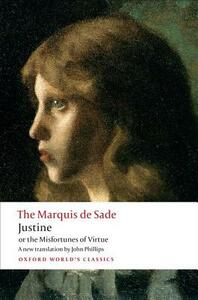Take a photo of a barcode or cover
Dear God, what a ride this was. From the perspective of a literary scholar, I realize I should place De Sade's works into the perspective of 18th century France and consider them of a transformational character, appreciate the novelty and bravery of these works which are completely opposed to the norms of their time, and perhaps even applaud the philosophical essays with which these works are littered.
However, as a modern reader I cannot help but question the near illegible writing ("Expounding perfidious maxims", indeed), the often flimsy rhetoric applied by characters to justify their perfidious actions, and the awful misogyny, class-related hatred and cynicism that speaks from this tale; and conclude that this novel is perhaps best described as one of Western Literature's earlier examples of a porn-without-plot, of which much better versions (both in terms of writing and argumented philosophy) can be found in present-day fanfiction.
However, as a modern reader I cannot help but question the near illegible writing ("Expounding perfidious maxims", indeed), the often flimsy rhetoric applied by characters to justify their perfidious actions, and the awful misogyny, class-related hatred and cynicism that speaks from this tale; and conclude that this novel is perhaps best described as one of Western Literature's earlier examples of a porn-without-plot, of which much better versions (both in terms of writing and argumented philosophy) can be found in present-day fanfiction.
Este livro foi o que 120 Dias de Sodoma não conseguiu ser. Tenho pena de ter lido este depois, porque foi repetitivo em alguns aspectos, mas é indubitavelmente melhor. Sade intitulou 120 Dias de Sodoma ou a Escola da Libertinagem, mas o verdadeiro ensinamento está em Justine. Neste livro, o autor expõe belíssimos diálogos que questionam os desejos de homem, o valor do mal e do bem e as consequências da libertinagem e da virtude. Enfim, reflectimos obrigatoriamente sobre a moral e colocamos mesmo em causa a nossa conduta e os nossos valores, porque, afinal, nem Justine (representando aqui a fé) é tão pura assim.
Moral philosophy about the indifference of the universe and the bad outcomes of the good intentions intersperced with pornography.
challenging
dark
sad
tense
slow-paced
Plot or Character Driven:
A mix
Strong character development:
No
Loveable characters:
No
Diverse cast of characters:
No
Flaws of characters a main focus:
Yes
Sade's villains don't simply force themselves on our courageous heroine.
No, each display of brute force and each iteration of amoral violence that Providence metes out to Justine is followed by a series of sophistical arguments in which the perpetrators attempt to justify their behavior by appealing to the fact of natural depravity ("I was born this way, nature is at fault, etc). To many of us moderns who are living in the long shadow cast by the Enlightenment, this curious quality of Sade's libertines cannot but strike as unsettling. It is as if Sade is proposing, at the height of Enlightenment, and anticipating Nietzsche, that what we call reason is simply violence by different means; will to power folding unto itself and emerging ever more pathological.
Thematically speaking, Justine can be thought of us as an idiosyncratic response to the story of Job, Boethius' Consolation of Philosophy, glorifying what the latter rejects, and Voltaire's Candide, without the latter's anti theistic overtones. For me, this novella reinforces Pierre Klossowski's thesis that Sade is a closet gnostic. Justine's fate shows that those who keep to the path of virtue will incur the wrath of the evil Supreme Being who revels in libidinal pandemonium.
No, each display of brute force and each iteration of amoral violence that Providence metes out to Justine is followed by a series of sophistical arguments in which the perpetrators attempt to justify their behavior by appealing to the fact of natural depravity ("I was born this way, nature is at fault, etc). To many of us moderns who are living in the long shadow cast by the Enlightenment, this curious quality of Sade's libertines cannot but strike as unsettling. It is as if Sade is proposing, at the height of Enlightenment, and anticipating Nietzsche, that what we call reason is simply violence by different means; will to power folding unto itself and emerging ever more pathological.
Thematically speaking, Justine can be thought of us as an idiosyncratic response to the story of Job, Boethius' Consolation of Philosophy, glorifying what the latter rejects, and Voltaire's Candide, without the latter's anti theistic overtones. For me, this novella reinforces Pierre Klossowski's thesis that Sade is a closet gnostic. Justine's fate shows that those who keep to the path of virtue will incur the wrath of the evil Supreme Being who revels in libidinal pandemonium.
challenging
dark
sad
medium-paced
Plot or Character Driven:
A mix
Strong character development:
No
Loveable characters:
No
Diverse cast of characters:
Complicated
Flaws of characters a main focus:
Yes
dark
reflective
sad
tense
medium-paced
Plot or Character Driven:
A mix
Loveable characters:
No
Flaws of characters a main focus:
Yes
I love reading works with philosophies I (mostly) disagree with, and at times de Sade makes a few pretty solid points; it's a very thought-provoking book once you look past all the debauchery lmao
challenging
dark
funny
fast-paced
Plot or Character Driven:
Character
Strong character development:
No
Loveable characters:
No
Diverse cast of characters:
No
Flaws of characters a main focus:
Yes
Graphic: Misogyny, Pedophilia, Rape, Sexual assault, Sexual violence, Slavery, Torture, Blood, Trafficking
adventurous
challenging
dark
emotional
reflective
sad
slow-paced
Plot or Character Driven:
Character
Strong character development:
No
Loveable characters:
No
Diverse cast of characters:
No
Flaws of characters a main focus:
Complicated




